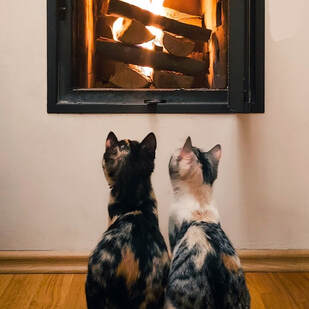|
July is designated as Pet Fire Safety Month, and it is a great time to make sure you are doing everything possible to prevent a fire, as well as planning for your cat should a house fire happen. Sadly, it is estimated that half a million pets perish in house fires every year. Reading, understanding, and implementing these suggestions could keep your beloved feline (and you) safe.  Prevention Cats are notoriously curious. Anyone with a cat who has ever burned a candle or lit a fireplace has had a moment of panic seeing their cat peer with wonder into a dancing flame. Here are some ways you can help prevent disaster from striking: Candles: Keep candles out of reach from your cat. Always be sure to monitor burning candles and extinguish candles entirely before leaving your home. If your cat displays too much interest in lit candles, try battery-operated flameless candles for the flickering effect or an electric candle warmer to disperse candle scents. Fireplaces: A fireplace grate or barrier keeps curious cats away from fireplaces and is a wonderful investment. Cats are creatures of comfort and will undoubtedly be drawn to the warmth of a fire, so set up a cozy spot a safe distance away from lit fireplaces. Heat Sources: Like fireplaces, cats are drawn to space heaters. It is always important to monitor heaters and never let your cat get too close. Like fireplaces, grates and barriers are useful tools to keep kitty from starting a disaster. Cook Tops: Curious cats have been known to knock a stove knob to the on position. Remove knobs completely or invest in knob covers to keep a stovetop accident from occurring. Loose Electrical Cords and Wires: A lot of cats, especially kittens, will chew on anything. If you have ever had to chase your cat around the house trying to keep her or him from ingesting a plastic bag, chances are they will be interested in cordage as a snack too. Besides looking delicious to some cats, cords and wires can also look like toys. Be sure to conceal and secure all electrical cords and wires. Preparedness After you have taken all of the preventative steps to keep your cat from starting a house fire, here are some things you can do to increase the chances your cat will survive a fire should one break out in your home. Familiarize Yourself with Their Habits: Make a mental note of where kitty runs to hide when frightened and where they like to sleep during the day. Should a fire emergency happen, you can check those common spots first or alert firefighters to possible locations they could be hiding. Smoke Detectors: Make sure you are testing smoke detectors monthly, replacing batteries once a year, and replacing the entire detector 10 years from the date of manufacture. The date of manufacture is on the back of your detector. For added protection, link your smoke detectors to an alarm monitoring system that will call emergency services for you if smoke is detected. Exit Bag and Carrier: Good for any emergency, keeping a go-bag for your cat is necessary in a fire event. Cats will become frantic in fire situations, and a secure carrier is a great way to confine them and get them out. Keep your carrier near an exit and ensure extra security by having another placed at a second exit. Window Stickers: Window stickers will alert emergency personnel to the number of pets inside your home that may require rescuing should you be unable to alert them. Microchip or Tags: Make sure your cat has up to date microchip or tag information. During the commotion of a fire, a lot of cats will make a break for a safe and quiet place to hide away from the house. If your pet is separated from you, a microchip is the best way to ensure their safe return. House fires can be devastating and scary. Taking the necessary precautions of prevention and preparedness could help ensure that, while you may lose material possessions, you do not lose your irreplaceable companion. Comments are closed.
|
Categories
All
Archives
November 2022
|
|
Plymouth Sun Sailor 2019 and 2020
Readers' Choice Best Veterinary Clinic |
Clinic Hours
Monday - 9:00 am - 6:00 pm Tuesday - 9:00 am - 6:00 pm Wednesday - 9:00 am - 6:00 pm Thursday - 9:00 am - 6:00 pm Friday - 9:00 am - 6:00 pm |
|
Site powered by Weebly. Managed by IDEXX Laboratories

 RSS Feed
RSS Feed



